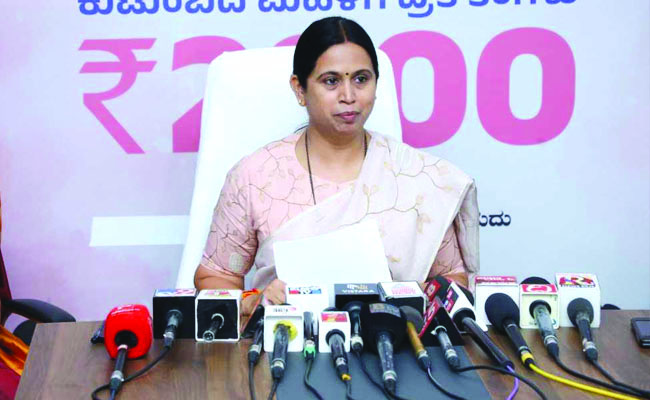Karnataka: Early education conundrum
Reshma Ravishanker (Bengaluru)
After the national education Policy (NEP) 2020 mandated reconfiguration of the 10+2 primary-secondary schooling system into a new 5+3+3+4 continuum formally integrating early childhood care and education (ECCE) into elementary education, several states across the country have begun the process of integrating three years of early childhood education by introducing kindergarten sections in composite primary/secondary government schools and/or upgrading anganwadis — Central/state government-promoted nutritional centres for newborns and lactating mothers — into pre-primary schools.
In the southern state of Karnataka (pop.69 million), an initiative to upgrade 20,000 (of a total 62,580) anganwadis into pre-primaries to make them ‘NEP compliant’ was announced by the state’s BJP government in 2022. A year later, a new Congress government was voted into power in the legislative assembly election of May 2023. Fortunately, although it has rejected and scrapped statewide implementation of NEP 2020 legislated by the BJP government at the Centre, it has continued to upgrade the state’s anganwadis.
Indeed, according to some ECCE educators, the state’s Congress government has ventured beyond upgrading anganwadis, and permitted 262 composite government schools to start kindergarten sections (LKG and UKG) in 2023-24.
With these KG sections running successfully, on June 11, the state’s education ministry issued an order to start pre-primary/KG classes in an additional 1,008 government primary schools in the Kalyana Karnataka region (educationally backward districts of Bidar, Kalaburagi, Raichur, Yadgir, Ballari, Vijayanagara, and Koppal) and 578 schools in other districts. However, this latest government initiative has riled the state’s 69,000 anganwadi workers who fear loss of employment. They apprehend that parents will enrol youngest children for pre-primary classes in government schools rather than in anganwadis.
Simultaneously, this initiative of the state government has escalated simmering tension between the education ministry and the women and child development (WCD) ministry as government schools fall under the former’s jurisdiction and anganwadis under WCD. Reacting, Chief Minister Siddaramaiah has ordered chief secretary LK Atheeq to initiate parleys between the two ministries and arrive at a workable solution.
On June 24, a meeting was called by the chief minister between Madhu Bangarappa, minister for school education and literacy, and Laxmi Hebbalkar, minister of WCD. After these parleys, the CM’s office announced that the education ministry has been directed not to start any new pre-primaries in government schools beyond the already sanctioned 2,786, and that a committee of experts will soon be constituted to chalk out a plan to upgrade the state’s anganwadis to deliver equivalent quality early years education. But the challenge of transforming anganwadis into pre-primaries is that the overwhelming majority of anganwadi workers are class X secondary school-leavers with no formal training in early childhood education.
“Anganwadis were promoted under the Centre’s Integrated Child Development Scheme (ICDS) in 1976 and entrusted with five responsibilities — immunisation of children, provision of nutrition, provision of health checkups, health/nutrition education and pre-primary education. Until NEP 2020 was legislated, no government emphasised the education function of anganwadis. Now they want anganwadi workers to transform overnight into early childhood teachers with the threat that failing this transformation, they will start pre-primary sections in government schools. This will be a big mistake as thousands of anganwadi workers will lose their jobs. In several memoranda to the government we have demanded that anganwadis should be recognised as formal pre-primaries/ECCE centres and all anganwadi workers with school-leaving qualifications should be provided training to deliver early childhood education,” says Varalakshmi, president of CITU (Centre of Indian Trade Unions) which represents the Anganwadi Workers Association.
According to WCD minister Laxmi Hebbalkar, the state government has drawn up a plan to upskill anganwadi workers. Under the plan, anganwadi staff with bachelor’s degrees will be trained in the first phase, class XII graduates in the second and class X school-leavers in the third phase. The top-ranked Azim Premji University, Bengaluru has been entrusted with the task of upskilling anganwadi centre heads.
Yet upskilling and training of these workers requires the Central and state governments to substantially raise the budgetary allocation for ICDS. In 2024-25, the (Congress) government allocated Rs.4,500 crore for the state’s 62,580 anganwadis with an enrollment of 3.6 million children — Rs.12,500 per child per year — an amount insufficient to provide adequate nutrition, let alone professionally administered pre-primary education.
“The budget outlay of the WCD ministry needs to be substantially increased. Dr. Kasturirangan committee’s NEP 2020 draft report clearly shows how investment in early years education by far outweighs investment in other stages of school education or skills education. With anganwadis already discharging several duties, workers/helpers need not fear losing their jobs and protest the introduction of early years education in government schools. Anganwadi workers are already overburdened. Therefore if preschools are integrated with primary schools and anganwadi centres function as day care centres for infants, it would be a huge boon to working parents from disadvantaged communities. A state government that is bold enough to do this together with the curricular and pedagogic reforms mandated by NEP 2020 will be able to revolutionise not only early years education but also early years care giving which is almost completely absent today depriving working parents from EWS (economically weaker sections) a very basic facility,” says Prof. B.S. Rishikesh, Head — Hub for Education, Law, and Policy, Azim Premji University, Bengaluru.
With NEP 2020 having clearly highlighted the critical importance of formal early childhood education, there’s an emerging consensus among educators that all pre-primary education and care institutions including anganwadis, should fall within the jurisdiction of the education ministry at the Centre and in the states, allowing WCD to focus on issues of gender equity, egalitarianism, and greater participation of women in the workforce.

















Add comment